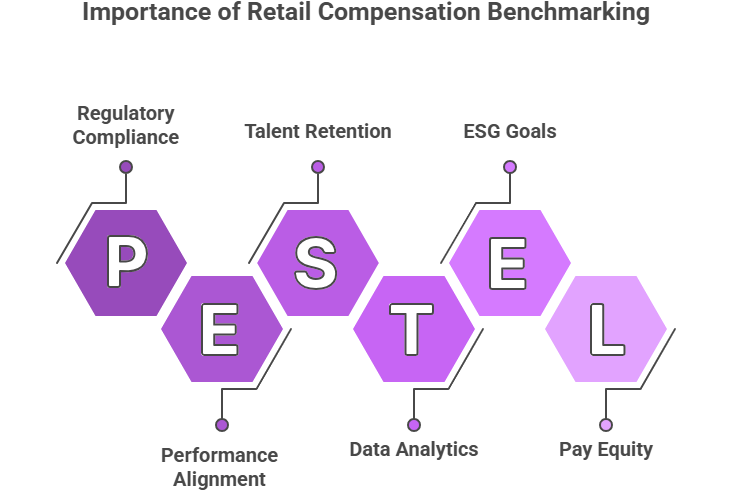The modern retail ecosystem is undergoing a structural shift, where digital storefronts, physical outlets, and logistics networks now operate as a unified value chain. As brands scale across online and offline touchpoints, their workforce compositions have grown increasingly diverse, encompassing in-store sales teams, supply chain staff, digital marketers, data analysts, and warehouse operatives.
However, this evolution has also exposed a major strategic blind spot: disparity in pay structures across channels. Many retail enterprises still maintain fragmented compensation systems, where offline store associates follow incentive-based models while e-commerce teams are benchmarked against tech or digital benchmarks. This lack of alignment often leads to pay inequities, inconsistent motivation levels, and talent migration between formats.
Against this backdrop, Nexdigm’s Compensation Benchmarking Competitive Intelligence provides retail and e-commerce businesses with a scientific approach to assess, calibrate, and optimize workforce pay structures, ensuring that compensation not only attracts and retains talent but also aligns with omnichannel business goals.
The Importance of Compensation Benchmarking in Retail Transformation
The retail industry’s ongoing transformation from traditional brick-and-mortar to omni-channel ecosystems has not only redefined customer journeys but also the economics of workforce management. Compensation models that once revolved around store sales and physical operations must now adapt to include digital commerce functions, tech-enabled logistics, and hybrid workforce dynamics.

- Bridging Pay Gaps Across Diverse Workforce Clusters: E-commerce and physical retail often operate with distinct compensation logics. Without structured benchmarking, these pay disparities can lead to internal inequity and disengagement, especially as employees transition between roles across channels. Compensation benchmarking helps create transparent pay bands, aligning roles based on complexity, output, and skill value.
- Aligning Compensation with Performance and Profitability: Modern retail requires agility in linking pay to business KPIs such as fulfillment accuracy, customer satisfaction, digital conversion rates, and delivery efficiency. Benchmarking enables leadership to evaluate the cost-to-performance ratio across similar roles in the industry, optimizing wage investments to maximize ROI. This ensures that compensation evolves from a static expense to a dynamic performance lever.
- Enhancing Talent Retention and Employer Brand Equity: In an industry with high attrition rates competitive pay benchmarking helps retailers retain critical talent and attract skilled professionals in emerging domains such as data analytics, supply chain optimization, and customer engagement. Moreover, a well-structured pay architecture enhances brand reputation in the job market, signaling transparency, fairness, and long-term stability.
- Supporting Regulatory and ESG Compliance: With global mandates around pay transparency, diversity, and equity reporting gaining momentum, especially in North America and Europe, compensation benchmarking also supports compliance frameworks. Retail enterprises leveraging structured benchmarking frameworks gain the ability to report equitable pay practices, aligning with ESG goals and stakeholder expectations.
Nexdigm’s Retail Compensation Benchmarking Framework
In an era where retail enterprises operate across multiple channels, compensation structures must reflect both operational complexity and evolving role diversity. Traditional salary comparisons no longer capture the nuances of omnichannel retail, where warehouse operatives, delivery personnel, data analysts, and digital marketers all contribute to a unified customer journey. Recognizing this need, Nexdigm’s Retail Compensation Benchmarking Framework combines data intelligence with strategic advisory to help businesses establish fair, competitive, and performance-linked compensation systems across their retail value chain.
- Multi-Source Data Intelligence: Nexdigm’s methodology draws from a robust network of data inputs to ensure reliability and accuracy. The process blends both macro and micro-level intelligence, analyzing pay variations across e-commerce, logistics, and physical retail operations. This comprehensive approach ensures that compensation strategies are not guided by perception but by quantified, market-aligned insights.
- Role Mapping and Job Evaluation: Each retail function is analyzed beyond job titles through structured role mapping and evaluation exercises. Nexdigm’s consultants assess parameters such as task complexity, decision-making scope, revenue impact, and skill criticality. This ensures that compensation benchmarks are grounded in true functional equivalence, enabling fair comparisons between roles such as a store manager, fulfillment lead, and online category specialist within the same enterprise framework.
- Market Benchmarking and Pay Band Calibration: By leveraging statistical modeling and competitive data analytics, Nexdigm identifies market medians, quartile positions, and incentive trends across various geographies and retail formats. The framework accounts for regional wage differentials, cost-of-living adjustments, and emerging role premiums driven by digital transformation. The result is a data-backed pay structure that balances internal equity with market competitiveness, ensuring talent attraction and retention without overinflating payroll costs.
- Strategic Insights and Implementation Support: Nexdigm goes beyond pure benchmarking to deliver actionable insights that guide decision-making. Leadership dashboards highlight compensation disparities, incentive effectiveness, and total reward alignment. Additionally, scenario modeling tools help retail leaders evaluate the financial impact of pay revisions, while analytics-driven advisory supports ESG-linked reporting and pay transparency compliance. This holistic approach transforms benchmarking outcomes into strategic workforce intelligence.
Through this integrated framework, Nexdigm helps retail enterprises move from fragmented pay structures to a data-driven, harmonized compensation ecosystem. By aligning compensation with business performance, skill relevance, and market positioning, organizations can achieve stronger retention, higher workforce motivation, and a sustainable competitive advantage in the evolving world of omnichannel retail.
To take the next step, simply visit our Request a Consultation page and share your requirements with us.
Harsh Mittal
+91-8422857704

